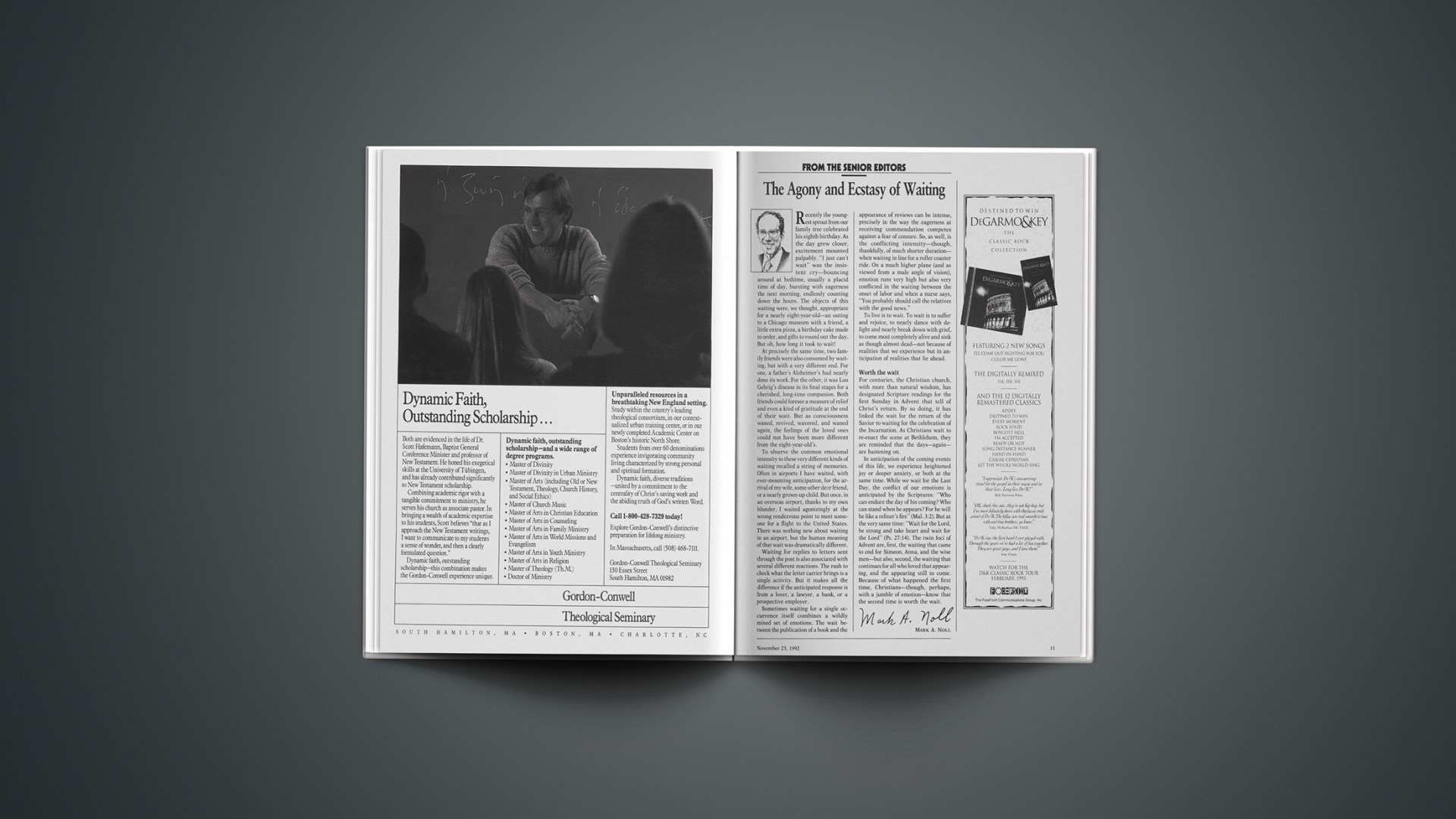Recently the youngest sprout from our family tree celebrated his eighth birthday. As the day grew closer, excitement mounted palpably. “I just can’t wait” was the insistent cry—bouncing around at bedtime, usually a placid time of day, bursting with eagerness the next morning, endlessly counting down the hours. The objects of this waiting were, we thought, appropriate for a nearly eight-year-old—an outing to a Chicago museum with a friend, a little extra pizza, a birthday cake made to order, and gifts to round out the day. But oh, how long it took to wait!
At precisely the same time, two family friends were also consumed by waiting, but with a very different end. For one, a father’s Alzheimer’s had nearly done its work. For the other, it was Lou Gehrig’s disease in its final stages for a cherished, long-time companion. Both friends could foresee a measure of relief and even a kind of gratitude at the end of their wait. But as consciousness waned, revived, wavered, and waned again, the feelings of the loved ones could not have been more different from the eight-year-old’s.
To observe the common emotional intensity to these very different kinds of waiting recalled a string of memories. Often in airports I have waited, with ever-mounting anticipation, for the arrival of my wife, some other dear friend, or a nearly grown-up child. But once, in an overseas airport, thanks to my own blunder, I waited agonizingly at the wrong rendezvous point to meet someone for a flight to the United States. There was nothing new about waiting in an airport, but the human meaning of that wait was dramatically different.
Waiting for replies to letters sent through the post is also associated with several different reactions. The rush to check what the letter carrier brings is a single activity. But it makes all the difference if the anticipated response is from a lover, a lawyer, a bank, or a prospective employer.
Sometimes waiting for a single occurrence itself combines a wildly mixed set of emotions. The wait between the publication of a book and the appearance of reviews can be intense, precisely in the way the eagerness at receiving commendation competes against a fear of censure. So, as well, is the conflicting intensity—though, thankfully, of much shorter duration—when waiting in line for a roller coaster ride. On a much higher plane (and as viewed from a male angle of vision), emotion runs very high but also very conflicted in the waiting between the onset of labor and when a nurse says, “You probably should call the relatives with the good news.”
To live is to wait. To wait is to suffer and rejoice, to nearly dance with delight and nearly break down with grief, to come most completely alive and sink as though almost dead—not because of realities that we experience but in anticipation of realities that lie ahead.
Worth The Wait
For centuries, the Christian church, with more than natural wisdom, has designated Scripture readings for the first Sunday in Advent that tell of Christ’s return. By so doing, it has linked the wait for the return of the Savior to waiting for the celebration of the Incarnation. As Christians wait to re-enact the scene at Bethlehem, they are reminded that the days—again—are hastening on.
In anticipation of the coming events of this life, we experience heightened joy or deeper anxiety, or both at the same time. While we wait for the Last Day, the conflict of our emotions is anticipated by the Scriptures: “Who can endure the day of his coming? Who can stand when he appears? For he will be like a refiner’s fire” (Mal. 3:2). But at the very same time: “Wait for the Lord, be strong and take heart and wait for the Lord” (Ps. 27:14). The twin foci of Advent are, first, the waiting that came to end for Simeon, Anna, and the wise men—but also, second, the waiting that continues for all who loved that appearing, and the appearing still to come. Because of what happened the first time, Christians—though, perhaps, with a jumble of emotion—know that the second time is worth the wait.
MARK A. NOLL










